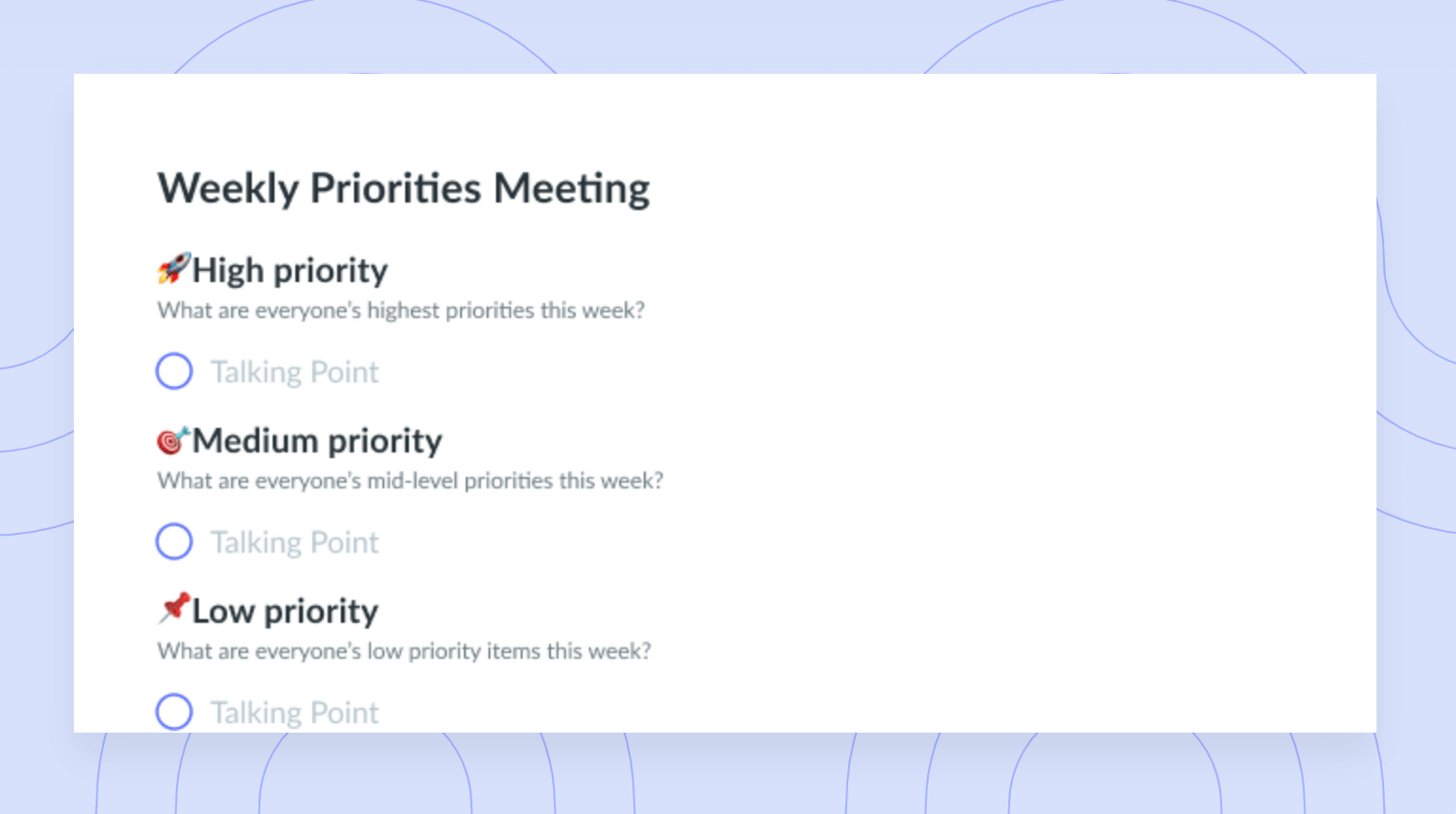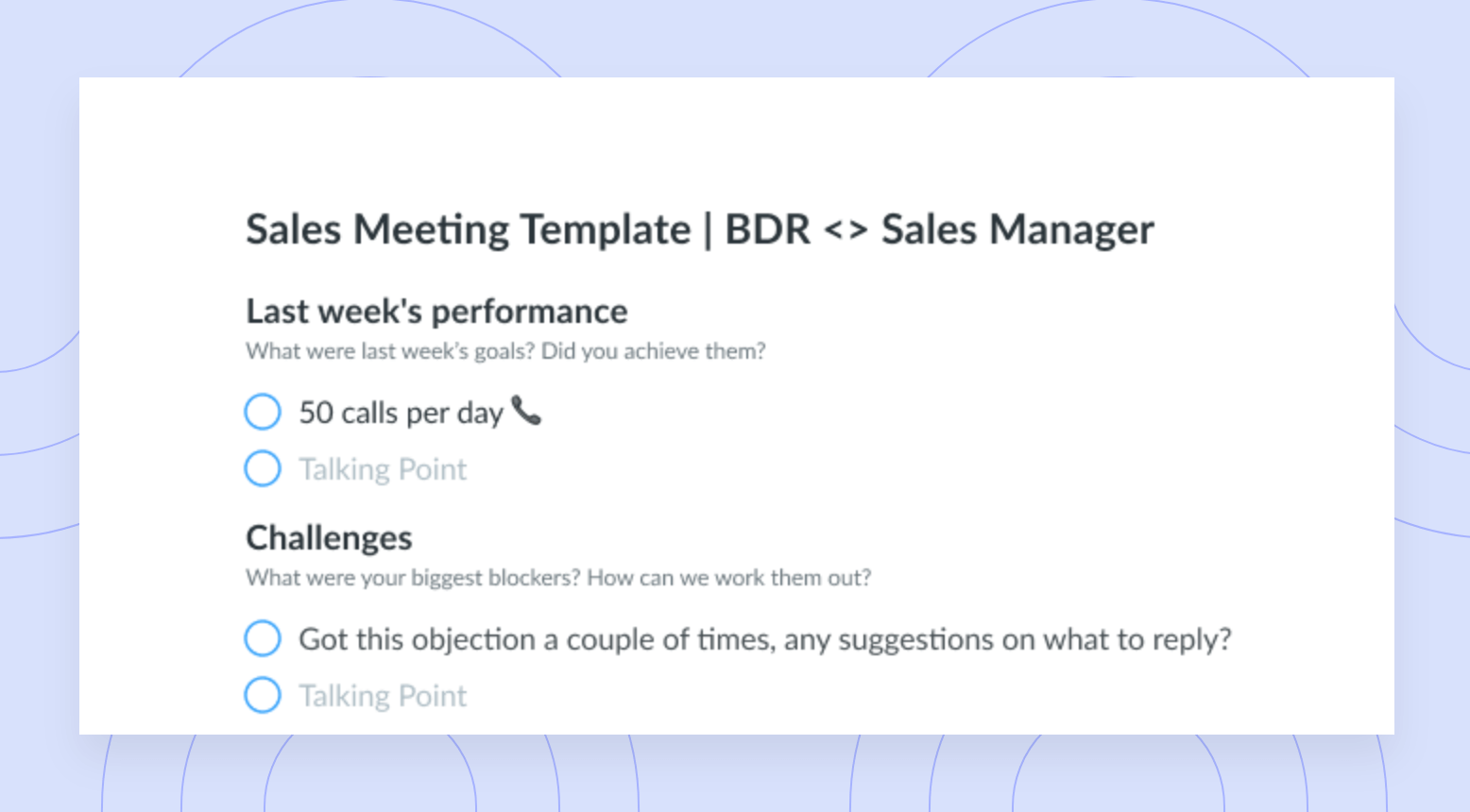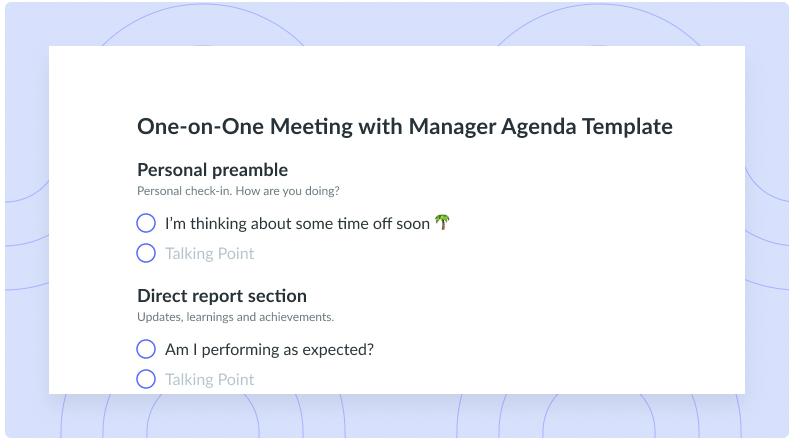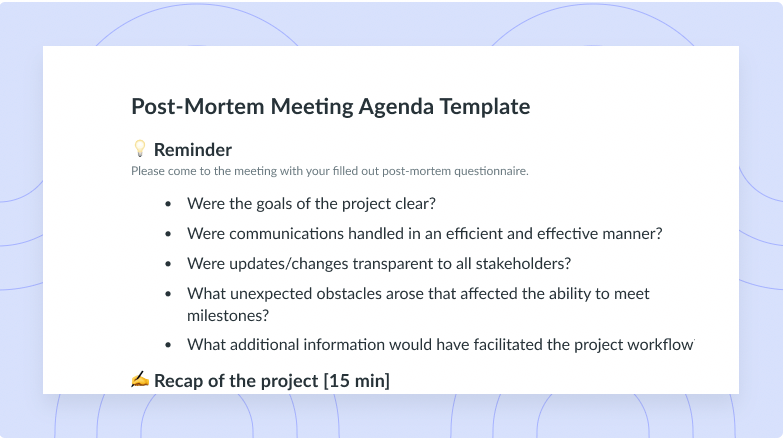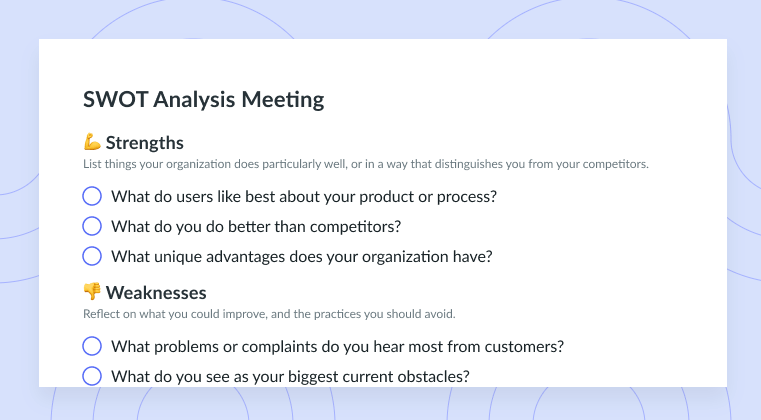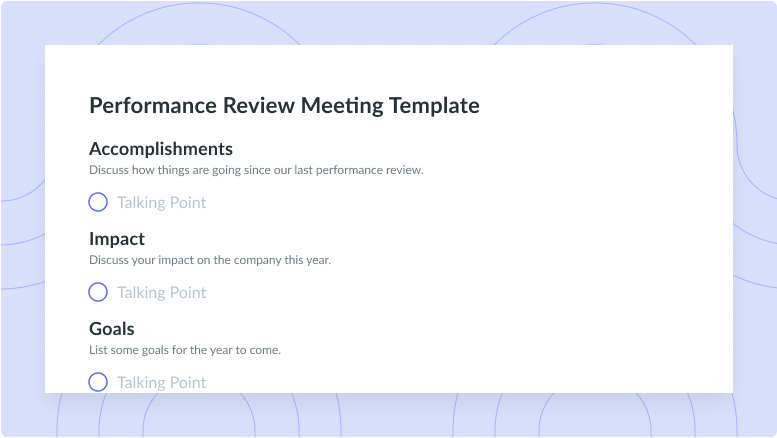
Effective Staff Meeting Agenda Template
Get this templateLeverage the power of staff meetings with this framework curated by Claire Hughes Johnson, Corporate Officer and Advisor at Stripe.


Effective Staff Meeting Agenda Template
Staff meetings are valuable opportunities to discuss a wide range of company decisions or updates that impact the staff in attendance. They can be helpful in creating team-building exercises or providing insight into changes or adjustments to administrative operations. Effective staff meetings have a schedule to ensure staff can participate but also to ensure accountability and participation.
A staff meeting may be an opportunity for the company to communicate information or for members of the staff to share viewpoints, concerns, and needs with business leaders. This could include the announcement of new hires or promotions, awards or updates to procedures, as well as program status updates and new clients or contracts. The versatility of staff meetings makes it possible to include a range of topics. However, meetings need to be organized and focused on specific goals. A Claire Hughes Johnson staff meeting agenda and template can help to ensure this.
Lisa McQuerrey of Chron writes, “The objective of a staff meeting is to provide updates, deliver announcements, solicit feedback, share information and participate in a team environment. To be effective, staff meetings should have a detailed agenda, a time limit, and a designated moderator.”
How to Run an Effective Staff Meeting
Effective staff meetings need some preparation, including work on developing an agenda and outlining the specific goals of the meeting. Best practices within staff meetings typically include encouraging accountability of each member, encouraging all to participate, and agreeing to disagree. It is also important to have a meeting that does not allow over-talking or interruptions.
Follow this staff meeting agenda sample created by Claire Hughes Johnson to ensure success.
What’s inside this Staff Meeting Template:
1Check-In
What’s top of mind? Share one answer that is work-related and one that is personal.
Each staff meeting begins with a check-in in which the facilitator states the time of the meeting, its location, and the company’s name. During check-ins, the facilitator of the meeting recognizes each member of the staff present, so this information can be documented.
What’s most important or top of mind? Open the door to communication by asking members about what they are focused on, perhaps both work- and personal-related. Greet members of the meeting and encourage open communication from the start.
2 Purpose
What is the purpose of this meeting?
Outline the purpose of the meeting. Why is everyone gathering? What are the most important factors to discuss during this meeting? Set some early expectations of what every staff member in the meeting can expect to occur. There’s no need for surprises. Instead, flesh out the specifics about the meeting, including why it is happening, who should be involved, and what the purpose of meeting in this format is (such as in person or virtually). The purpose allows people to become invested in the meeting from the start.
3Agenda Items
What agenda items are we discussing today?
Outline all agenda items for the meeting next. This should include all topics to discuss during the meeting. Create a logical flow from one to the next that builds the conversation as needed. Outline specific topics and important components of that topic, such as recent changes in policy, why those changes occurred, and what to expect going forward.
Joel Schwatzberg of Harvard Business Review states, “An agenda is a helpful meeting roadmap but not an effective tool for conveying your key points. So, in addition to creating an agenda, conceive and prepare a few brief but valuable points in advance.”
4Decisions
What decisions are we making today? What types of decisions are we making?
Outline the specific decisions being made during the staff meeting. These are decisions being made today and not shelved until the next meeting. Discuss the types of decisions and the goals of the meeting, such as to decide on whether a project goes forward as well as who will be responsible for it or the underlying result of the decisions made.
Outline decisions expected as a way to ensure participants within the meeting are engaged and ready to make that decision or communicate their opinions about the decision. Ensure individuals understand those goals early on.
5Check-Out
What is your takeaway from this meeting? What are your thoughts on the meeting?
Outline the specific decisions being made during the staff meeting. These are decisions being made today and not shelved until the next meeting. Discuss the types of decisions and the goals of the meeting, such as to decide on whether a project goes forward as well as who will be responsible for it or the underlying result of the decisions made.
Outline decisions expected as a way to ensure participants within the meeting are engaged and ready to make that decision or communicate their opinions about the decision. Ensure individuals understand those goals early on.
Dan McCarthy from The Balance Careers states, “Keep track of action items and make sure people do what they say they are going to do. It’s frustrating to show up at the next meeting and find out half the team didn’t bother doing what they committed to in the last meeting. Follow up before the meeting and hold individuals accountable for their commitments.”











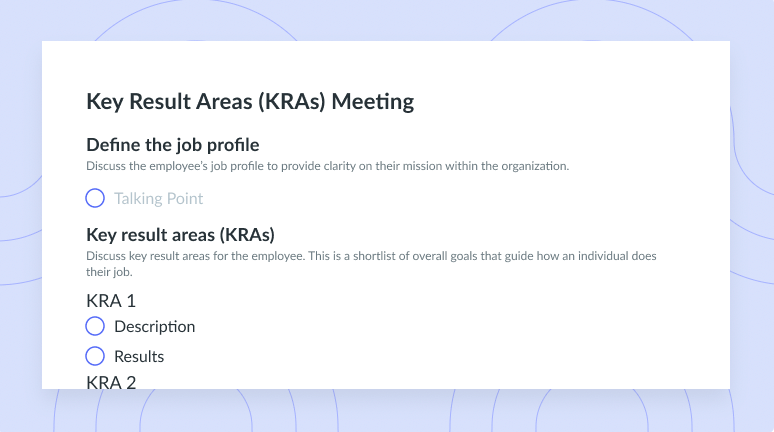
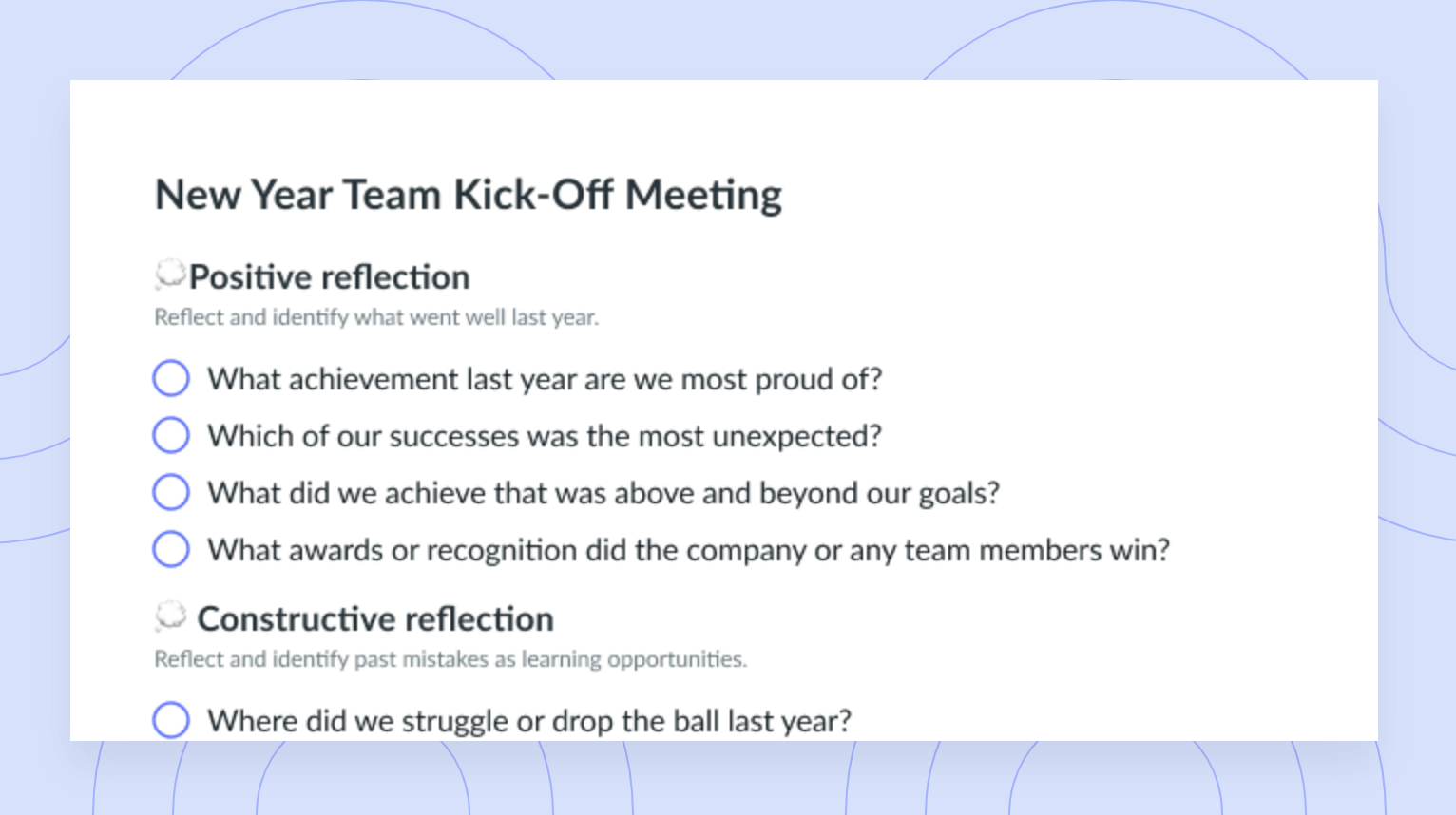
![What? So What? Now What? [Reflection Meeting] Template](https://fellow.app/wp-content/uploads/2021/08/What-So-What-Now-what-preview-v2.png)
